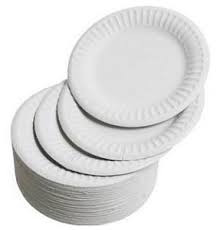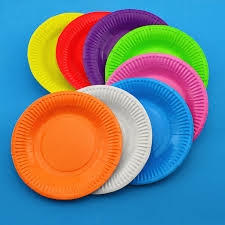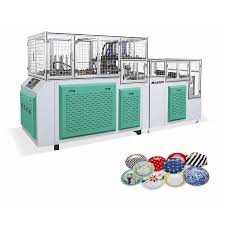![]()
If you’ve landed on this article page, you’re probably searching for a
good business idea—an idea that’s light on the pocket but heavy on
returns, promising both a fulfilling journey and potential profit.
|
How to Start a Paper Plate Manufacturing Business in Nigeria
The paper plate making business involves the production of
disposable plates made from paperboard or coated paper. These
plates are convenient, lightweight, and easily disposable,
making them a popular choice for a wide range of events. Paper
plates can be categorized into various types based on their
size, shape, and design. They can range from small dessert
plates to large dinner plates, with options for customization to
suit specific requirements.
Paper plates are widely used in various occasions and events,
including parties, picnics, and catering services. The demand
for disposable and eco-friendly alternatives to traditional
dinnerware has been increasing steadily. This presents a
lucrative business opportunity for aspiring entrepreneurs.
These devices are made to effectively transform paper into a
range of plate sizes and shapes, meeting the increasing need for
environmentally friendly substitutes for plastic. They are
frequently used to make plates for events, food stands, and
everyday home use in both small enterprises and large-scale
production facilities. For anyone wishing to enter the
disposable plate industry, these machines are an excellent
investment due to their high production rates and consistent
quality, which are ensured by their automation and precision.
Before starting a paper plate making business, it is crucial to
conduct thorough market research to gain insights into the
industry, target market, and competition. Here are some key
steps for conducting market research:
Identify your target market segments, such as households,
restaurants, or catering services.
Analyze market trends and consumer preferences regarding paper
plate usage.
Assess the demand-supply scenario in your local area and
identify potential gaps.
Study the purchasing behavior and preferences of your target
customers.
Gather data on existing paper plate manufacturers, their market
share, and product offerings.
Potential Market and Profitability:
The demand for paper plates is driven by several factors,
including the increasing trend of organizing events and the need
for convenient and hygienic disposable dinnerware. The market
for paper plates is vast and includes households, restaurants,
hotels, catering services, and event management companies.
The profitability of the paper plate making business depends on
various factors such as production efficiency, pricing strategy,
raw material costs, and market demand. With effective planning,
quality control, and marketing efforts, this business can
generate a substantial income.
A paper plate making machine
cost anywhere between
N10M to N15M
depending on its features, automation degree, and production
capacity.
Developing a Brand Identity for Your Paper Plate Business
Creating a strong brand identity is crucial for differentiating
your paper plate business from competitors and building customer
loyalty. Consider the following elements when developing your
brand:
Unique value proposition: Identify and highlight the unique
features and benefits of your paper plates, such as
eco-friendliness, durability, or innovative designs.
Brand name and logo: Choose a distinctive and memorable brand
name and design a visually appealing logo that reflects your
business values.
Brand messaging: Develop clear and compelling brand messaging
that communicates your brand's mission, quality standards, and
commitment to customer satisfaction.
Determining the Required Workforce
Determining the appropriate workforce for your paper plate
making business depends on factors such as production capacity,
shifts, and the complexity of your manufacturing process. The
key roles you may need to consider include:
Production operators: Skilled workers responsible for operating
the paper plate making machines and ensuring smooth production
flow.
Quality control personnel: Individuals responsible for
inspecting and ensuring the quality of the finished paper
plates.
Maintenance technicians: Skilled technicians who can
troubleshoot and repair machinery and equipment.
Administrative staff: Employees responsible for managing
day-to-day administrative tasks, including procurement, sales
coordination, and documentation.
Setting Competitive Prices for Your Paper Plates
Setting the right prices for your paper plates is crucial to
ensure profitability while remaining competitive in the market.
Consider the following factors when determining your pricing
strategy:
Cost of raw materials: Calculate the cost of paperboard or
coated paper, adhesives, and other materials used in production.
Manufacturing costs: Consider labor costs, electricity expenses,
machine maintenance, and other overhead costs.
Packaging and transportation costs: Include the costs of
packaging materials and transportation when calculating the
final price.
Market analysis: Analyze the prices offered by competitors and
consider the perceived value of your paper plates in the market.
Profit margin: Determine the profit margin you aim to achieve
and factor it into your pricing strategy.
Exploring Online and Offline Selling Options
To optimize your sales and distribution efforts, consider a
combination of online and offline selling options:
Online presence: Invest in a user-friendly website with
e-commerce functionality to enable direct online sales. Utilize
social media platforms and digital marketing strategies to
promote your paper plates and engage with customers.
Offline presence: Establish relationships with retail stores,
supermarkets, and party supply shops to display and sell your
paper plates. Participate in local events or set up stalls at
trade fairs and exhibitions to showcase and sell your products.
By diversifying your sales channels and leveraging both online
and offline opportunities, you can expand your customer base and
increase sales.
Sourcing High-Quality Raw Materials
The quality of raw materials used in the production of paper
plates significantly impacts the final product's strength,
durability, and appeal. Here are the primary raw materials
required for paper plate manufacturing:
Paperboard: Select high-quality paperboard with appropriate
thickness and stiffness for the desired plate strength.
Coated paper: If you prefer coated paper plates, ensure the
coating material is food-safe and suitable for the intended use.
Adhesives: Use food-grade adhesives to bond the layers of
paperboard or coated paper together.
Identifying the Required Machinery and Equipment
Investing in the right machinery and equipment is crucial for
the production of high-quality paper plates. Here are the key
machines and equipment required for a paper plate making
business:
Paper plate making machine: This machine is the core equipment
for manufacturing paper plates. It includes various components
like a forming station, heating elements, and cutting tools.
Die-cutting machine: Used for cutting paperboard into the
desired shapes and sizes of the paper plates.
Printing machine: If you plan to offer customized designs, a
printing machine is essential for adding patterns or logos to
the plates.
Raw material handling equipment: This includes machines for
storing, cutting, and feeding the raw materials, such as
paperboard or coated paper.
Packaging equipment: Machines for packaging the finished paper
plates efficiently.
What is the process of paper plate making machine?
The machine is first
filled with paper sheets, which it automatically feeds and cuts
into the appropriate shape. The paper is then molded into a
plate shape by the machine using heat and pressure, giving it
edges and grooves. The completed plates are then ready for
packing after being finally ejected. High-quality paper plates
are produced with less waste thanks to this effective, automated
technique.
Starting a paper plate making business requires careful
planning, market research, and strategic execution. By
understanding the industry landscape, complying with legal
requirements, investing in infrastructure and machinery, and
implementing effective marketing and quality control strategies,
you can establish a successful and profitable venture. Keep in
mind the importance of customer satisfaction, sustainability,
and innovation to stay competitive in the evolving paper plate
industry. With perseverance, dedication, and a focus on
continuous improvement, you can embark on a rewarding
entrepreneurial journey in the paper plate making business.
Get our Practical Training Guide on how to start a Plate Paper
Manufacturing Business in Nigeria.
A specialized piece of machinery called a paper plate machine is
used to produce paper plates in a range of sizes and designs. It
works by cutting and forming paper into the shape of plates,
frequently by applying pressure and heat together to create the
paper into strong, disposable plates. These machines come in a
range of sophistication, from completely automatic to manual
models that can produce at high speeds. For small- to
large-scale manufacturing facilities
|







